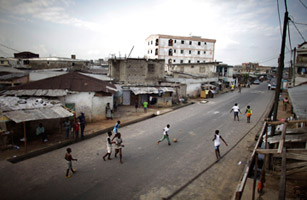
Children play football on the streets in Douala, Cameroon May 22, 2010.
(3 of 4)
Idiocy in soccer can reach criminal extremes. The sport divides, in rivalries that can reach the intensity of vicious hate: a Colombian player, Andrés Escobar, was murdered in Medellín after inadvertently scoring an own goal in the 1994 World Cup. But it can also unite. With the exception of war, nothing brings out a shared sense of national identity, of almost family belonging, like international soccer competition. In Honduras, a country dangerously divided following a coup d'état last year, the national team's qualification for this year's World Cup managed to bring people together.
Some years ago, I witnessed an example of reconciliation on the soccer field that was even more spectacularly unlikely. Following the 1994 genocide in Rwanda, in which nearly 1 million people were killed (mostly with machetes) in 100 days, more than 100,000 alleged murderers, members of the majority Hutu, who had sought to eliminate their Tutsi compatriots from the face of the earth, were jailed. In 2003, 40,000 received amnesty. To mark the occasion, a soccer game was held — in a town where the slaughter had been particularly savage — between returning Hutu génocidaires and relatives of their victims, who from that day would be obliged to live side by side again. Some 5,000 people watched the game, with just two policemen in attendance. It was conducted in a spirit of fair play so impeccable that soccer's Victorian British rulebook writers would have applauded. The Tutsi team won 1-0, and at the end of the game, when I interviewed the players, all said the contest had been a victory for peace.
"Soccer," Eto'o says, "is pure sentiment and a spectacle that transcends all borders. It's the best weapon against political conflict. It would be hard to see Iran and the United States seated at the same table, but it's perfectly feasible to see them playing a game of soccer." (This indeed happened, without any drastic consequences, in the 1998 World Cup in France.) An extreme case of soccer as icebreaker is that of the young Palestinian suicide bombers of the Al-Aqsa Martyrs Brigades who, in the course of an interview with a journalist from the London Sunday Times in 2002, interrupted their celebrations of anticipated mass murder on Israeli soil to cheer — with cries of "God is great!" — the news that their infidel hero David Beckham had scored two goals in a Manchester United victory.
A Tool for Social Progress
Soccer is different. Trevor Edwards, corporate vice president of global brand management for Nike, a company that has become involved with the game only in the past 16 years, believes that the relationship people have with it stands alone in the wide world of sports. "Now that we're also a soccer company," Edwards says, "we've noticed that there is nothing like the emotional connection that people have with soccer. There is a tribal instinct that comes with it. But at the same time, with the tribal instinct comes this common understanding of brilliance, of brilliant play. It doesn't matter — you can be Brazilian, you can be Spanish, you can be English. If you are amazing, you transcend all that."
This is true. Players like Eto'o and, even more so, his contemporary greats Messi and Cristiano Ronaldo generate admiration everywhere. But the tribal instinct, the impulse to identify and pay homage, is stronger than mere admiration of talent. "Players are gods, the stands are the pews, football is the new religion," wrote Stephen Tomkins, author of A Short History of Christianity. Eto'o is indeed a god in Cameroon. As with Diego Maradona, who won the World Cup practically single-handedly for Argentina in 1986, songs have been written to celebrate him in his homeland. Players like Eto'o and Maradona, and Drogba, and Pelé in his day in Brazil and Wayne Rooney today in England have become emblems of national prestige, filling the roles great generals or kings occupied in ancient times. They have even usurped the role of Hollywood stars. Details of Beckham's private life are of more consuming interest to more people than those of Brad Pitt's.